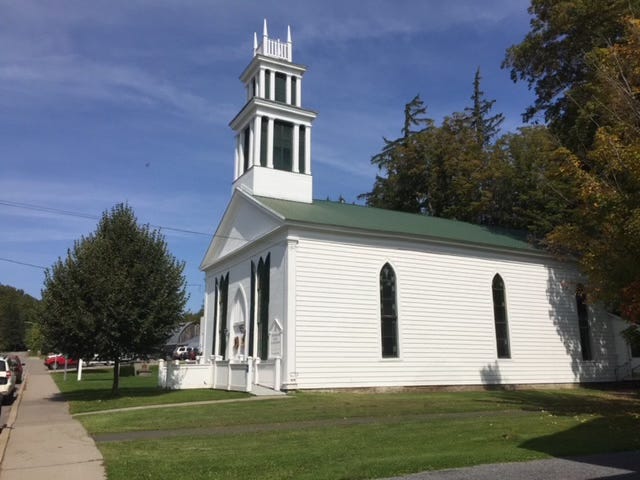Hello Friends,
My wife encouraged me this morning to verbally podcast last week’s written offering, A Blessing By Any Other Name, Part II. She reminded me that some people follow The Church’s One Foundation by listening to it rather than reading it. I even had one subscriber tell me this week, “Well, they’re a little too long sometimes to read.” I’ll try to take that into consideration in the future.
All that to say, my wife usually “wins out,” so here is last week’s episode as a podcast for those who might give it a listen on their way to work or Trader’s Joe.
Till March 20…
Be of Good Cheer!
D. Paul
A BLESSING BY ANY OTHER NAME
In our previous podcast of Feb. 21, A Blessing by Any Other Name, I wrote (somewhat tongue-in-cheek) that, “Owing…to my residual anger as a wounded child rocked in the cradle of fundamentalism, I’m having something of a sympathetic response to the Pope’s Feducia Supplicans.” While there is truth in that casual aside, there are other, more compelling reasons for my appreciation of the Pope’s controversial “Declaration,” which permits the “pastoral blessings” (vs. “liturgical blessings”) of same-sex couples.
As a dramatist for over fifty years, my life has been immeasurably enriched by my brilliantly gifted gay colleagues. I and my wife have loved these dear friends, socializing, collaborating, and caring for them, as best we could, through the HIV/AIDS crisis. As I recall that horrific epidemic, which, to date, has taken nearly a million lives in the US alone, a distinctive friend inevitably comes to mind: his name was Loic Mirabaud. He was from France, preternaturally smart, strikingly handsome, with a charming, winsome personality. And he happened to be gay. As a young man, he ran in heady company, from Elizabeth Taylor to presidential hopefuls. We met in 1973 at the Lee Strasberg Theatre Institute in NYC and became good friends. Over the course of the next twenty years, Loic worked with and for me on several artistic projects, including a recently released film shot 35 years ago, Of Things Past. When he contracted HIV/AIDS, most of his Catholic family, with the exception of his sister who was living on Île de Ré at the time, abandoned him; curiously so, as one of Loic’s direct ancestors—Honoré Gabriel Riqueti (Ri.ca.tee) de Mirabeau—was admired as a “father” of the French Revolution, until he was ostracized for being a paid, clandestine intermediary between the monarchy and the revolutionaries. Now, two hundred years later, here was Monsieur Loic Mirabeau, no longer a young bon vivant, desperately ill, ostracized by family and so many in the Church, and needing a place to call home. My wife, Debby, took the initiative, and Loic moved in with us for the last three months of his life.
We adjusted the guest bedroom on the second floor, directly down the hall from us, to accommodate Loic’s modest possessions and medical necessities. Fortunately, there was an en-suite bedroom on another floor where family, who had previously scheduled a visit with us, could stay. Sadly though, soon after meeting Loic, they expressed their discomfort at someone with AIDS living with us. After all, “He might be contagious,” and his being there suggested that we approved of his “lifestyle.” Other than a cursory goodbye before leaving to go home, they never saw or acknowledged Loic again during their week’s visit. For some time, I remained disappointed and upset by their exclusion of our dear and dying friend, and it may have been their attitude that sealed my commitment to do everything I could to help my gay friends through this awful plague, praying, along with my wife, that Loic and others would be protected from the blatant ignorance, animus, and ostracism so prevalent at the time.
My “pastoral” belief then and now was and is quite simple: as followers of Jesus Christ, we’re urged to give that “cup of water” without asking anything prior from the recipient. There are no pre-conditions, other than “I thirst.” So, yes, I affirm the good intentions of Pope Francis as expressed in the “Declaration,” where pastoral blessings are described as “an expression of the Church’s maternal heart,” and “Thus, when people ask for a blessing, an exhaustive moral analysis should not be placed as a precondition for conferring it.” But good intentions only tell half the story. What are the results of those intentions? And this leads us to the duplicity within “Feducia Supplicans.”
Authoritatively, the Declaration tells us that couples seeking a blessing in this “pastoral” context “do not claim a legitimation of their own status,” but rather are only asking that “all that is true, good, and humanly valid in their lives and their relationships be enriched, healed, and elevated….” Apparently, we are to infer from this statement that same-sex relationships per se are not “true, good, and humanly valid…,” but illegitimate. Believing this interpretation is a real leap of faith, as it asks a lot from gay couples who would normally receive such a blessing as simply “God’s favor and protection…sanction or support” (Oxford English Dictionary). The truth is, this is precisely what same-sex couples are receiving and claiming—“a legitimation of their own status,” for despite all the Declaration’s circuitous obfuscations to the contrary, this is, in practice, the message being sent: “God’s favor and protection, sanction and support be upon you.” After all—IT’S A BLESSING—call it by any other name, a blessing is still a blessing, and it’s sheer sophistry to suggest otherwise.
At the risk of promoting the slippery-slope theory, the Vatican’s placating overture of “pastoral blessings” will do little to stem the tide demanding full, ceremonial inclusion within the Church. “Separate but equal” won’t fly anymore, and the LGBTQIA+ church community wants access to the same baptismal font and sacramental altar that you and I want. And who can blame them. As the fictional gay organist, Jonathan Malone, expresses it in my play, The Presentment, written in 1997: “I'm not interested in entering the church through the side door (pastoral blessings). If I can't enter through the front door with the processional blasting (liturgical blessings), I'm not interested in entering at all.”
In stark contrast, another character in The Presentment, the provocateur of the play—The Rev. Samuel Jennings—poses the disturbing questions we all prefer to sidestep, gloss over, or better yet—ignore. “What if,” he asks (and I paraphrase my own play), “what if God—the God of Creation, the God of Mosaic Law, and, yes, even the God of Leviticus, and Romans 1, and I Corinthians 6:19—what if this God, whose immutable Word is God, were right about everything, and it is we who are wrong.” And so, the Reverend Jennings laments, “Today a man will marry, think of it—marry another man—and I, as a priest, am asked not to condemn it as a sin, but to bless it as if it were a sacrament!”
And so it goes, my friends. Unimaginable really, that in less than thirty years millenniums of tradition and Scripture have been dismissed and same-sex marriage is now the law of the land and the crowning jewel of every inclusive church in the country, resulting ultimately, I believe, in the trans epidemic and pernicious gender ideology sweeping through our culture. For there is something (or is it Someone) inherent in the divine nature of marriage, which is reflective of Christ and his Bridegroom, the Church, that cannot be tampered with so brazenly. Traditional marriage is more than a mere pillar propping up a fractured Church and a collapsing society, but a pivotal, stabilizing cornerstone, infusing God’s ordained, familial template into a fractious culture. And now, with marriage so radically altered, civilization, certainly as we’ve known it, will never be the same. Even now, with the increasing dissolution of the family, we are witnessing a spirit of unprecedented, wanton lawlessness. And to think, it all began with “good intentions,” including my own. Mea culpa.
Now, thirty years later, I join those ninety Catholic priests, scholars, and authors (and millions more) who have asked the leaders of their Church to forbid same-sex blessings within their jurisdictions, and have called upon Pope Francis in their “Filial Appeal” to withdraw the Declaration: “In this difficult moment, a clear word of truth would be the best example of your faithful and courageous dedication to the people of God entrusted to you, a sign of fidelity to the true mission of the papacy, and at the same time the best help for the pope himself, an eloquent ‘fraternal correction,’ which he urgently needs in this last and most critical period of his pontificate and probably of his life.” My, my … what a bold corrective.
If the Pope were to withdraw the Declaration, he might not be comforted by this fact: there are thousands of churches in America that will perform pastoral, same-sex blessings and liturgical, same-sex marriages. The one has been the precursor to the other. May it not be so in the Catholic Church.
In way of an afterword, my brothers and sisters in Christ, I offer this: I woke at dawn this morning thinking about what I’d do differently if I had the opportunity of being with Loic again during the endgame of his life. Three things came to mind: I would have loved him more; I would have judged him less (see Romans, chapter 2); and I would have told him in clearer terms the wonderful story of Jesus and his love.
Also, I pray that I have written to you in the Spirit, and ask for your forgiveness when I’ve fallen short.
Amen
“The Church’s One Foundation Is Jesus Christ Her Lord!”














Share this post